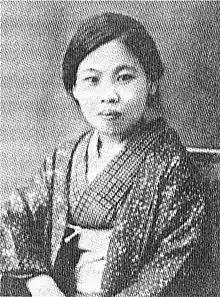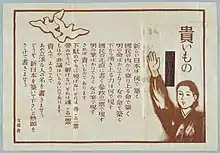Hanayo Ikuta
Hanayo Ikuta (14 October 1888 – 8 December 1970) (in Japanese, 生田 花世), born Nishizaki Hanayo, was a Japanese feminist writer, editor, and educator.
Hanayo Ikuta | |
|---|---|
生田 花世 | |
 Hanayo Ikuta as a young woman | |
| Born | Nishizaki Hanayo 14 October 1888 Izumiya Village, Tokushima Prefecture |
| Died | 8 December 1970 (age 82) |
| Other names | Kikuko Chosokabe (pseudonym) |
| Occupation(s) | Writer, editor, educator, feminist |
Early life
Hanayo Nishizaki was born in Izumiya Village, Itano District, Tokushima Prefecture,[1] the daughter of Yasutaro Nishizaki. She was a student at the Tokushima Prefectural Girls' High School, and trained to be a teacher.
Career

Ikuta wrote for magazines beginning in her teens, and was a elementary school teacher as a young woman. She moved to Tokyo in 1910, after her father died. Ikuta edited and wrote for literary magazines and women's periodicals, including Seitō (Bluestocking), Beatrice, Nyonin Geijutsu,[2] and Women and Labor.[3][4][5] She wrote cultural reviews, including a 1914 review of a Japanese performance of George Bernard Shaw's Mrs. Warren's Profession,[6] and first-person essays on womanhood, including essays on the "chastity debates".[7] Her 1914 article, "On Hunger and Chastity", asked, "Is it possible for a female clerk to earn a livelihood and yet also not worry about being able to perfectly protect her precious chastity?" She concludes that the family, social, and economic structures of early 20th-century Japan forced some women to choose between life and respectability, by excluding women with no other support from property ownership and professions.[6][8]
Ikuta published a book of poetry in 1917, and a novel in the early 1920s. In the 1930s she visited Japanese troops in Taiwan,[9] and wrote about Manchurian cuisine. During World War II she was a government worker, before she was burned in an air raid. After the war, she led literary discussions for women, and published a popular edition of The Tale of Genji.[10] A quote by Ikuta was used on a poster for the 1946 general election, encouraging women to vote.[11][12]
Personal life
She married writer Ikuta Shungetsu and used his family name.[6] Her husband died by suicide in 1930. She died in 1970, at the age of 82.[7]
References
- Coutts, Angela (1 September 2013). "How do we write a revolution? Debating the masses and the vanguard in the literary reviews of Nyonin geijutsu". Japan Forum. 25 (3): 362–378. doi:10.1080/09555803.2013.804106. ISSN 0955-5803. S2CID 144825496.
- Coutts, Angela (1 January 2012). "Imagining Radical Women in Interwar Japan: Leftist and Feminist Perspectives". Signs: Journal of Women in Culture and Society. 37 (2): 337. doi:10.1086/661713. ISSN 0097-9740. S2CID 146460664.
- Mulhern, Chieko Irie (1994). Japanese Women Writers: A Bio-critical Sourcebook. Greenwood Publishing Group. p. 139. ISBN 978-0-313-25486-4.
- Ericson, Joan E. (1 September 1997). Be a Woman: Hayashi Fumiko and Modern Japanese Women's Literature. University of Hawaii Press. pp. 41–42, 44. ISBN 978-0-8248-1884-5.
- Loftus, Ronald P. (30 June 2004). Telling Lives: Women's Self-Writing in Modern Japan. University of Hawaii Press. p. 64. ISBN 978-0-8248-6456-9.
- Mackie, Vera (26 February 2003). Feminism in Modern Japan: Citizenship, Embodiment and Sexuality. Cambridge University Press. pp. 49–50, 67 note 16. ISBN 978-0-521-52719-4.
- Suzuki, Michiko (2010). Becoming Modern Women: Love and Female Identity in Prewar Japanese Literature and Culture. Stanford University Press. p. 52. ISBN 978-0-8047-6197-0.
- Kano, Ayako (2016). Japanese Feminist Debates: A Century of Contention on Sex, Love, and Labor. University of Hawai'i Press. pp. 35–37. ISBN 978-0-8248-7381-3. JSTOR j.ctvvn1vp.
- Buchheim, Eveline; Futselaar, Ralf (2014). Under Fire: Women and World War II: Yearbook of Women's History/Jaarboek voor Vrouwengeschiedenis 34. Uitgeverij Verloren. p. 39. ISBN 978-90-8704-475-6.
- Tokushima Literature Gallery, Tokushima Prefectural Museum of Literature and Calligraphy.
- "Poster from the First Postwar General Election". Library of Congress, Washington, D.C. 20540 USA. Retrieved 3 November 2022.
- "5-5 General Elections". Modern Japan in archives, National Diet Library. Retrieved 3 November 2022.
External links
- Tomi Suzuki, "Envisioning Women Writers: Female Authorship and the Cultures of Publishing and Translation in Early 20th Century Japan" (PhD dissertation, 2012, Columbia University)